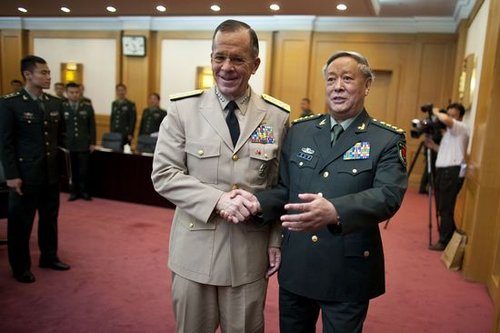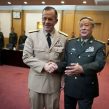
China Reacts to Admiral Mullen Visit; Growth Imperative Challenges Even Chinese Security Regulations
Publication: China Brief Volume: 11 Issue: 14
By:

China Reacts to Admiral Mullen Visit
Beijing heralded US Chairman of the Joint Chiefs of Staff, Admiral Michael Mullen, visit to China as an important step forward, signifying the normalization US-China military relations. Chinese magazine Liaowang described military-to-military relations as an important barometer of US-China relations since 1949, whether confrontation, conflict or cooperation (July 18). The official view out of Beijing is the one expressed by the People’s Liberation Army (PLA) Chief of the General Staff, Chen Bingde: “we have been glad to witness the rejuvenation of bilateral military relations, as they are often hard-won and should be treasured” (Xinhua, July 14). Other commentators in the Chinese press however have expressed disappointment with the Chen-Mullen talks.
Coverage of the South China Sea issue elaborated on the divisions Chen raised in the press conference after his meeting with Mullen. Chen rebuked Washington’s repeated intent to avoid disputes in the area, stating "[Washington’s] behavior has given some opposite signals" (Xinhua, July 11). Chinese press reiterated Beijing’s belief that the territorial disputes of the South China Sea should be dealt with bilaterally without US involvement or exercising its military near China, especially when tensions are high. One observer characterized Admiral Mullen’s remarks as very proper and diplomatic, but belied US interference in the South China Sea, military exercises to counter China and intelligence collection on sensitive Chinese facilities (Xinhua, July 21). This contradiction between words and actions demonstrates, according to Chinese sources, Washington’s unwillingness to be transparent (touming) about its intentions (Xinhua, July 18).
From the Chinese vantage point, the real issues between China and the United States in the South China Sea are US provocations and “freedom of navigation.” On the former, Beijing blames the United States for organizing regional pushback against China and exacerbating tensions through military exercises with the Philippines and Vietnam (Xinhua, July 21). As Chen stated in the joint press conference, "if the United States truly wants peace and stability in the region, it should adjust the schedule of its military drills" (Xinhua, July 11). On the latter, Chinese sources remain unanimous: freedom for merchant ships to travel directly from port to port is very different than freedom for US warships and surveillance ships to observe Chinese military exercises or sensitive facilities (Guangzhou Ribao, July 17; Caixun.com, July 21; Xinhua, July 11). The latter, as Ministry of National Defense spokesman Geng Yansheng noted, damages whatever trust the two militaries might build (MOD.gov.cn, July 27).
Chinese scholars panned Mullen’s speech at Renmin [People’s] University, focusing on his statement that China was no longer a rising power but had already arrived on the world stage. In an interview, Shi Yinhong noted calling China a “great power” (da guo) is not a new formulation for dealing with China, but an old one dating back to Richard Nixon. US arms sales to Taiwan, intervention in the South China Sea, and intrusive surveillance in sensitive Chinese military areas suggest Washington actually does not see and respect China as a great power. Calling China a great power is simply a cover for Washington to define and place new responsibilities on China, which are not in China’s interests (Guangzhou Ribao, July 17).
The Chinese Ministry of National Defense spokesman’s characterization of Mullen’s visit as providing “positive results” was not entirely undermined by local observers. One scholar believed Mullen’s visits to Chinese military bases were good for two reasons. First, they showed a little bit more of China’s true capabilities, enhancing deterrence. Second, the visits showed Beijing was transparent—contrary to US accusations—removing an excuse for treating China differently (Xinhua, July 21).
Perhaps the best evaluation is the recognition, that while Beijing and Washington view the world in fundamentally different ways, silence and mistrust have consequences. "There are contradictions between China and the United States, some of which are even fundamental. However, neither of the countries can develop well without the other, as the two countries are highly interdependent," said Yao Yunzhu, a researcher with the PLA Academy of Military Science (Xinhua, July 14). Renmin University Professor Jin Canrong noted US-China relations are difficult to manage and we should not expect too much from just one meeting; however, it is much better to be able to sit and talk than to ignore each other (Guangzhou Ribao, July 17). More optimistically, Cheng Hongliang concluded Beijing and Washington now believe the US-China relationship is more than just “harmony leads both sides to benefit, conflict leads both sides to harm” (he ze liang li, dou ze liang shang) and that bad relations have strategic repercussions internationally (Liaowang, July 18).
Growth Imperative Challenges Even Chinese Security Regulations
Last month, Beijing launched an inter-ministerial inspection of Chinese military bases in seven provinces and Beijing Municipality to investigate the security environment around these facilities (Xinhua, June 9). The inspection teams found urban sprawl a danger to the efficiency of military operations, contrary to initial expectations. The most significant dangers identified by the teams were unlawful interference with the electromagnetic environment and skyscraper construction that limited radar visibility and altered flight patterns (Xinhua, July 10). The findings appear to have spurred new security awareness measures that presumably should have been dealt with by Hu Jintao’s revision to the law governing the protection of military facilities, casting doubt whether local enforcement of security regulations is possible when civilian economic growth is at stake.
The inspectors found 90 percent of the People’s Liberation Army (PLA) facilities maintained a solid security perimeter; however, the China Daily reported a series of urban encroachments on PLA installations. These included illegal hydroelectric projects causing flooding on a PLA shooting range, houses surrounding communications nodes, and new high rises affecting military air traffic (July 12; Xinhua, July 10). Meng Guoping, a PLA General Staff Department officer leading the effort, noted in the same interview that illegal construction projects had long impinged on militarily-sensitive areas and had affected military effectiveness. Meng stated “some important bases have effectively lost their ability to be used in war.”
The fanfare accompanying the launch of this round of base inspections spoke to the need of identifying foreign espionage and sabotage threats to military installations rather than domestically-generated concerns. Meng commented these inspections would become standard practice for enforcing security measures at military bases. Although led by the PLA, the inspection teams included the ministries of state security, public security and finance as well as other officials in the political-legal system. The teams investigated military facilities in Beijing, Heilongjiang, Qinghai, Henan, Jiangxi, Guangxi and Yunnan (Xinhua, June 9).
It is not clear what specifically is driving this round of security concerns that began earlier this year, but Hu Jintao signed new regulations governing military secrets and information handling (Xinhua, April 1). The last major round of security concerns were linked clearly to the PLA’s precautions around the Taiwanese presidential elections in 2008. The press highlighted China’s increasing reliance on information technology systems and telecommunications-related security concerns. Perhaps most interestingly, a public notice about the importance of security regulations from the Fourth Department of the PLA General Staff Department (4PLA), which is responsible for electronic warfare, accompanied the issue of the revised regulations (Hebei.com.cn, April 28). This suggests genuine concern about China’s vulnerability to electronic warfare and signals intelligence collection.
The violations of military security regulations suggest yet another contradiction between the economic growth imperative and local government action in other fields, such as environmental regulation and intellectual property protection. The Law on the Protection of National Military Installations passed in 1990 requires local governments to ensure secure military facilities do not face civilian encroachment.
In his recent book, Managing the China Challenge, Kenneth Lieberthal assessed Chinese political economy was structurally oriented toward producing GDP growth in ways that Beijing found difficult to manage when growth conflicts with other policies—like security. While accelerating urbanization and a large aspiring, but still not yet, middle class population require new construction and economic growth to sustain, Chinese Communist Party (CCP) cadre evaluations make growth a requirement for advancement [1]. This gives ambitious, low- and mid-level officials an incentive to avoid enforcing regulations if and when they inhibit economic growth, which accounts for the largest portion of their annual evaluations.
Since Hu signed the new regulations and the launch of the inspections, Chinese localities have promulgated new security regulations or announcements to address some of the concerns. For example, the Tianjin Municipal Government now requires new construction projects—including new buildings, renovation, and expansions—to be registered with the Tianjin State Security Bureau (Tianjin Ribao, May 31). Earlier this month, the Guangzhou Military Region headquarters announced a propaganda effort to inform citizens about the importance of protecting military facilities and secured several vulnerable communication cables (Zhongguang Wang, July 18). In Sichuan, one municipality held a work conference to address how the protection of military facilities supported both national security and development goals (Yibin Ribao, July 19). Lastly, the Supreme People’s Court issued a circular on July 21 to educate judges on investigating and prosecuting crimes related to the protection of military secrets (Jiefang Junbao, July 22).
These efforts may expand on the 1990 law, but they do not resolve the inherent central-local tension inherent where economic growth might be concerned. Central inspections could provide some impetus by shining a light on civilian encroachment of militarily-sensitive areas; however, the question still comes down to routine enforcement. If civilian encroachment is a problem inland of the more prosperous coastal provinces, then logic would suggest the more vital military bases along the coast facing Taiwan may be worse off.
Notes:
1. Kenneth Lieberthal, Managing the China Challenge: How to Achieve Corporate Success in the People’s Republic, Washington, DC: Brooking Institution Press, 2011, pp. 12-24.





